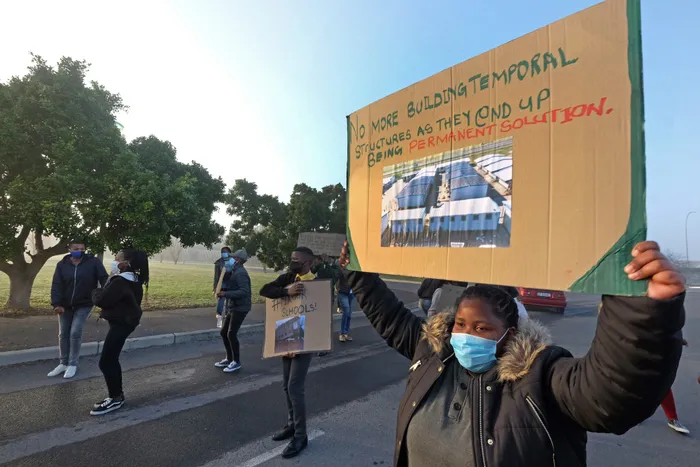’It makes me sad that the minister cut the education budget for SAA’

Learners and members of Equal Education picket at Western Cape Education Department offices, demanding that the prefabricated, temporary structures which was destroyed by storm at Nomzamo High School in Strand be replaced with properly built classrooms and toilets. Learners and members of Equal Education picket outside Western Cape Education Department offices. File picture: Ian Landsberg/ African News Agency (ANA)
Mahlaba Matloa, Imikha Mfati, Chwayita Wenana, Zama Mthunzi and Jane Borman
Cape Town - “I feel bad that the (education) budget has been cut because we need that money for infrastructure. In my school, we are overcrowded and that makes it hard to learn. Since we have a large capacity of learners and few classrooms,” says Mahlaba Matloa, a Grade 10 learner from Kgolokgothla Ledwaba Secondary School in Limpopo.
“It makes me sad that the Minister cut the (education) budget, for SAA. We have been fighting for infrastructure for a long time and this budget cut will give the department (of Basic Education) an excuse to further delay and say that they don’t have money. They could have taken the money and built classrooms and toilets that are safe,” Matloa reflects.
This testimony echoes what learners have been saying across the country – that Covid-19 is pushing already under-resourced schools over the edge.
The emergence of the pandemic, and the lockdown in South Africa, worsened already existing challenges for learners, teachers and parents. But government funding failed to respond to these challenges. Not only was the infrastructure budget cut by a net R1.7 billion at the tabling of June’s special Covid-19 budget, but a further amount was taken away from basic education and sacrificed to help bail out state-owned enterprises (SOEs), during the Medium-term Budget Policy Statement (MTBPS). Almost R300 million was cut from the DBE budget to help finance a R10.5bn bailout for SAA. Over the next three years basic education funding will continue to fall below what is needed, while SAA will receive an additional R16.4bn.
The problem of bailing out SOEs is not new. Some of South Africa’s parastatals, of which SAA is just one, have been plagued with maladministration and corruption over the years requiring additional money to keep them afloat. President Cyril Ramaphosa singled out SAA in his 2020 State of the Nation Address, stating: “The extent of capture, corruption and mismanagement in SOEs is best demonstrated at South Africans Airways, which was placed in business rescue late last year.”
Civil society organisations, including Equal Education (EE), have previously questioned the rationale for constantly propping up failing SOEs. However, at a time when our country is witnessing rising poverty, inequality, and unemployment, the decision to prioritise bailing out SAA over social spending is even more unconscionable.
For years EE has been advocating for efficient and adequate budgeting. Ahead of Minister Tito Mboweni’s MTPBS, Equalisers (EE’s high school going members), parents and activists were outside Parliament with a strong message against budget cuts.
Mboweni, came out to the protestors, read our placards, turned his back and got into a large black Mercedes. Even with that disdainful behaviour, we did not anticipate what was to follow in his speech – not only cuts were not reserved but money was taken away to give to SAA.
The funding decisions laid out in the MTBPS, and the special Covid-19 Budget before that, will have dire consequences for communities, schools, and learners. The persistence of illegal pit latrines, improper infrastructure, lack of access to water, and overcrowding in predominantly poor and rural schools made the safe reopening of schools this year harder. On top of the debilitating effect of severe infrastructure backlogs, additional costs have arisen because of Covid-19. Schools in Limpopo were instructed to redirect 45% of their budgets to provide Covid essentials.
Despite this, basic education experienced a cut of R2.1bn earlier this year.
The impact of these long-term cuts cannot be overstated.
Seven years after the adoption of the Norms and Standards for Public School Infrastructure, our country still has schools that are made of dangerous material such as mud, zinc and asbestos. There are almost two thousand projects that have either been delayed or stopped completely due to cuts to infrastructure grants. The 2020 deadline of the aforementioned Norms and Standards is looming, and coupled with years of poor political will, these cuts will mean that the DBE yet again fails to comply with these legally binding deadlines.
There are also the neglected dangers of temporary structures such as prefabricated classrooms in the Western Cape. A case in point is Nomzamo High School in Strand that was destroyed by heavy storms this year.
An EE member who is a learner at Nomzamo High, Imikha Mfanti, reflects about the incident: “By now, the WCED (Western Cape Education Department) was supposed to have built proper infrastructure for our school. Also when we are inside the classes, we do not feel safe, we fear these prefabs can collapse at any time. And it’s difficult to learn because when it’s hot, the room is hot and when it’s cold, the room is cold. We demand proper, adequate learning structures”.
Government has a constitutional and political obligation to realise the right to quality and equal education for all learners. Bailing out SAA and other SOEs at a time when our education system is unequal and in crisis undermines every learner’s right to basic education. What we need now is for the DBE and National Treasury to put the interest of learners and teachers first by making education a frontline department.
* Mahlaba Matloa and Imikha Mfanti are learner members of Equal Education (EE); Chwayita Wenana is EE Western Cape deputy head of organising; Zama Mthunzi is EE Gauteng head of organising, and Jane Borman is EE’s parliamentary officer and researcher.
** The views expressed here are not necessarily those of Independent Media.